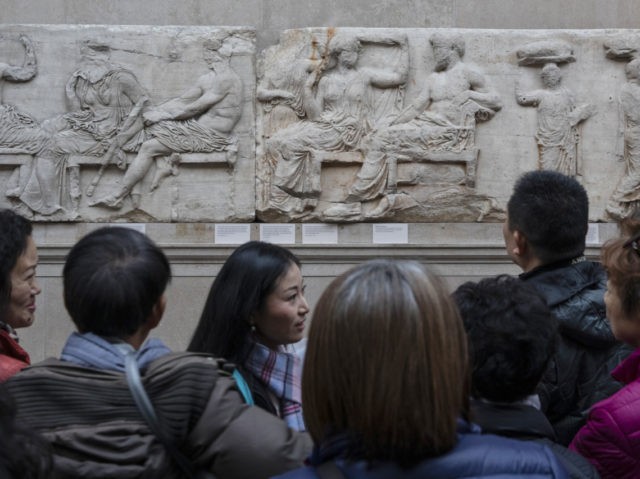Communist Party leader Xi Jinping flexed China’s soft power muscles in Athens on Tuesday when, during a play to bring Greece closer to China’s sphere of influence, he aligned himself with their demands to have a series of ancient marbles returned from the United Kingdom.
Pandering to the Mediterranean country’s ego by throwing his weight behind Greece’s decades-long campaign to have the Elgin Marbles returned from the United Kingdom, Xi Jinping continued the effort to set China up as an ally to Greece against Europe.
Breitbart has reported at length on the efforts of the Chinese ‘Belt and Road’ or ‘One Belt One Road’ programme to buy up or build infrastructure globally, using debt traps to leverage control in foreign capitals to further Chinese foreign policy goals. An August 2018 report noted how Athens fell in line with Beijing after China poured a billion dollars into a Greek port, an investment programme which has seen China buy up one-tenth of all European port capacity.
The report also cited a 2017 New York Times analysis of the pressures pushing Greece away from the European Union and towards China, including the Brussels-imposed austerity coming at the same time as financial inducements from Beijing:
While Europe was busy squeezing Greece, the Chinese swooped in with bucket-loads of investments that have begun to pay off, not only economically but also by apparently giving China a political foothold in Greece, and by extension, in Europe.
Last summer, Greece helped stop the European Union from issuing a unified statement against Chinese aggression in the South China Sea. This June, Athens prevented the bloc from condemning China’s human rights record. Days later it opposed tougher screening of Chinese investments in Europe.
Greece’s diplomatic stance hardly went unnoticed by its European partners or by the United States, all of which had previously worried that the country’s economic vulnerability might make it a ripe target for Russia, always eager to divide the bloc.
Instead, it is the Chinese who have become an increasingly powerful foreign player in Greece after years of assiduous courtship and checkbook diplomacy.
Continuing to double down on these investments and keeping Greece close, Xi himself visited Greece this week, in an effort to “deepen cooperation” with China’s “natural ally”. Agreements signed during the visit include an extradition treaty – resistance to a similar document proving so controversial it has triggered months of protests in Hong Kong, a region which has already realised the costs of being in close orbit of Beijing – agricultural deals, and the opening of the first Bank of China branch in Greece.
Telling Britain to give in to Greece’s demands and to return the ancient treasures – which the British Museum insists were removed legitimately and with the permission of Greece’s rulers at the time – is a parting gift from Xi to a country being heavily and persistently courted by Beijing.
The Associated Press reported of Tuesday’s demand:
Chinese President Xi Jinping on Tuesday urged Britain to return the Parthenon Marbles to Greece, wading into a decades-old dispute between the countries over the ownership of the sculptures.
The ancient friezes, which include depictions of battles between mythical ancient Greeks and centaurs, were taken by British diplomat Lord Elgin in the early 19th century and are now on display at the British Museum in London.
Britain has always refused to return the carvings — often still known as the Elgin Marbles — arguing that they were taken with the permission of local Ottoman rulers at the time.
Xi toured the Acropolis Museum, built partly to house the Parthenon Marbles, during a three-day visit to Athens and told his hosts he agreed with them that the sculptures should be returned.
“I assure you of our support, because we also have many Chinese cultural works outside our country that we are trying to recover,” Xi said on the last day of his official visit.
Greece has been campaigning for three decades for their return, arguing that the Ottoman empire was an occupying force and any permission granted during its time is not valid.
Athens had once considered suing Britain over the issue, an action reportedly championed by lawyer Amal Clooney.
But in recent years the Greek government has taken a more diplomatic route, asking the UN’s cultural agency UNESCO to mediate, an offer rejected by the British Museum.
Prime Minister Kyriakos Mitsotakis, elected in July, made an official request for the loan of marbles for the 200th anniversary celebrations of Greek independence in 2021.
The British Museum has said it would examine any request from Greece to borrow exhibits.

COMMENTS
Please let us know if you're having issues with commenting.